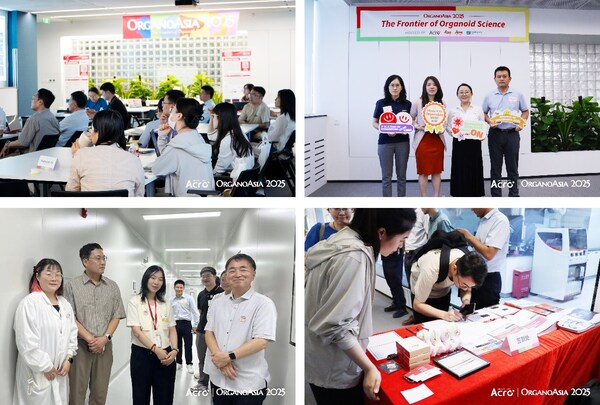Science
Leading Scientists Unveil Breakthroughs at OrganoAsia 2025

A significant advancement in organoid research was achieved at the OrganoAsia 2025 conference, held in Beijing on October 10, 2025. Organized by ACROBiosystems in collaboration with Leica Biosystems, Molecular Devices, and Leica Microsystems, the hybrid conference attracted over 500 participants, primarily from China, Japan, and South Korea. The event focused on the latest developments in organoid technology and its implications for precision medicine, drug discovery, and regenerative medicine.
Innovative Research and Applications
The conference featured prominent scientists such as Rosanna Zhang, Vice President of ACROBiosystems, and Li Liang, Associate Professor at the Southern University of Science and Technology (SUSTech). They discussed groundbreaking research in organoid applications for disease modeling, drug screening, and toxicology assessments.
During her presentation, Zhang emphasized the transformative role of organoids in drug testing, particularly as global regulatory policies increasingly favor alternatives to animal testing. She pointed out that organoids can closely mimic the human physiological environment, enhancing the accuracy of drug screening and safety evaluations. ACROBiosystems has developed a range of ready-to-use organoid products for critical organs including the heart, brain, liver, and lungs, with plans to expand their offerings to support high-throughput screening and innovative drug development.
Li Liang’s research team at SUSTech has established a biobank of patient-derived organoids, accurately reflecting organ microenvironments. Their work during the COVID-19 pandemic, particularly with a respiratory organoid platform, highlighted the differences in tissue tropism among SARS-CoV-2 variants, demonstrating how the Delta variant predominantly caused pneumonia, while Omicron BA.2 affected the upper respiratory tract. Additionally, they developed a dual-channel “organ-on-a-chip” that models gut-microbiome interactions and has since expanded to studies on viral encephalitis mechanisms and precision oncology.
Advancements in Toxicology and Regenerative Medicine
Professor Ki-Suk Kim from the Korean Institute of Toxicology presented on stem cell-based 3D organoid models. His research focuses on improving the precision of drug safety evaluations as the industry moves towards non-animal testing. The team engineered cardiac organoids that replicate human heart structures, integrating multi-ion channel detection with microelectrode array technology to assess drug impacts on cardiac health.
Meanwhile, Associate Professor Na Jie of Tsinghua University led a project that utilized 3D printing to create vascular organoids capable of repairing ischemic tissue. Their co-culture system, which integrates macrophages with heart organoids, has shown significant improvements in cardiomyocyte maturation. This innovative approach has broader implications for modeling cardio-cerebrovascular diseases and advancing regenerative medicine.
At the Institute of Science Tokyo, Associate Professor Yoh-Ichi Tagawa focused on a microfluidic gut-on-a-chip system aimed at understanding Inflammatory Bowel Disease (IBD). By co-culturing human intestinal epithelial cells with gut microbiota, his team successfully recreated key aspects of the intestinal environment, leading to discoveries about gut-immune interactions and the efficacy of the TNF-α inhibitor TPCA-1 as a therapeutic agent. Tagawa expressed enthusiasm for future projects that will integrate multiple organ models into complex human simulation systems.
The conference included a roundtable discussion addressing the pressing need for standardization in organoid research. Participants discussed quality control, data sharing, and the harmonization of operational protocols. Experts recognized that achieving highly mature organoids comparable to adult human tissues remains a challenge and emphasized the importance of regulatory acceptance to facilitate the use of organoid models in drug development.
The success of OrganoAsia 2025 has positioned ACROBiosystems at the forefront of international scientific collaboration. By fostering partnerships across the Asia-Pacific region, the company aims to enhance the integration of organoid science into industrial applications. During the conference, ACROBiosystems announced multiple collaboration agreements to further the development of organoid technology in areas such as drug discovery and precision medicine.
Founded in 2010, ACROBiosystems has established a global presence with offices and research facilities across the United States, Europe, and Asia. The company is committed to supporting the biopharmaceutical industry through innovative products and partnerships, contributing significantly to the future of healthcare and drug development.
-

 World5 months ago
World5 months agoSouth Korea’s Foreign Minister Cho Hyun to Visit China This Week
-

 Business5 months ago
Business5 months agoStarling Bank Plans Secondary Share Sale, Targeting $5.4 Billion Valuation
-

 Top Stories5 months ago
Top Stories5 months agoMunsang College Celebrates 100 Years with Grand Ceremony
-

 World5 months ago
World5 months agoPAS Aims to Expand Parliamentary Influence in Upcoming Election
-

 Business7 months ago
Business7 months agoKenvue Dismisses CEO Thibaut Mongon as Strategic Review Advances
-

 Lifestyle6 months ago
Lifestyle6 months agoHumanism Camp Engages 250 Youths in Summer Fest 2025
-

 Sports6 months ago
Sports6 months agoDe Minaur Triumphs at Washington Open After Thrilling Comeback
-

 Sports7 months ago
Sports7 months agoTupou and Daugunu Join First Nations Squad for Lions Clash
-

 Top Stories7 months ago
Top Stories7 months agoColombian Senator Miguel Uribe Shows Signs of Recovery After Attack
-

 World7 months ago
World7 months agoASEAN Gears Up for Historic Joint Meeting of Foreign and Economic Ministers
-

 Health6 months ago
Health6 months agoNew Study Challenges Assumptions About Aging and Inflammation
-

 Business7 months ago
Business7 months agoOil Prices Surge Following New EU Sanctions on Russia









